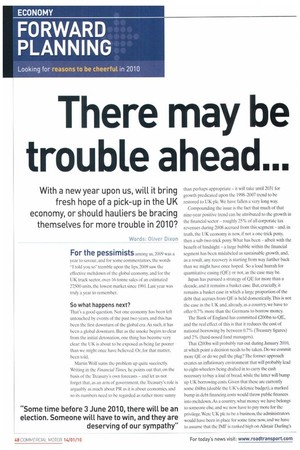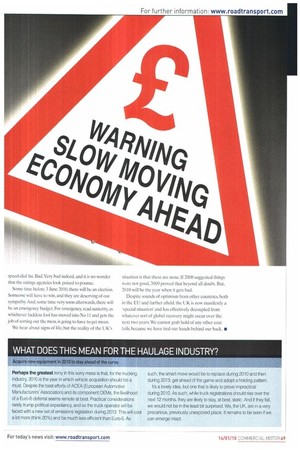There may be trouble ahead...
Page 48

Page 49

If you've noticed an error in this article please click here to report it so we can fix it.
With a new year upon us, will it bring fresh hope of a pick-up in the UK economy, or should hauliers be bracing themselves for more trouble in 2010?
Words: Otiver Dixon For the pessimists among us.2009 was a year to savour, and for some commentators, the words told you so" tremble upon the lips. 2009 saw the effective meltdown of the global economy, and for the UK truck sector, over-16-tonne sales of an estimated 27,500 units, the lowest market since 1991. Last year was truly a year to remember.
So what happens next?
That's a good question. Not one economy has been left untouched by events of the past two years, and this has been the first downturn of the global era. As such, it has been a global downturn. But as the smoke begins to clear from the initial detonation, one thing has become very clear: the UK is about to be exposed as being far poorer than we might once have believed. Or, for that matter, been told.
Martin Wolf sums the problem up quite succinctly. Writing in the Financial Times, he points out that, on the basis of the Treasury's own forecasts — and let us not forget that, as an arm of government. the Treasury's role is arguably as much about PR as it is about economics, and so its numbers need to be regarded as rather more sunny than perhaps appropriate — it will take until 2031 for growth predicated upon the 1998-2007 trend to be restored to UK plc. We have fallen a very long way.
Compounding the issue is the fact that much of that nine-year positive trend can be attributed to the growth in the financial sector — roughly 25% of all corporate tax revenues during 2008 accrued from this segment — and, in truth, the UK economy is now, if not a one-trick pony, then a sub-two-trick pony. What has been — albeit with the benefit of hindsight — a large bubble within the financial segment has been mislabeled as sustainable growth, and, as a result, any recovery is starting from way further back than we might have once hoped. So a loud hurrah for quantitative easing (QE): or not, as the case may be.
Japan has pursued a strategy of QE for more than a decade, and it remains a basket ease. But, crucially, it remains a basket case in which a large proportion of the debt that accrues from QE is held domestically. This is not the case in the UK and, already, as a country, we have to offer 0.7% more than the Germans to borrow money.
The Bank of England has committed £200bn to QE, and the real effect of this is that it reduces the cost of national borrowing by between 0.7% (Treasury figures) and 2% (hard-nosed fund managers).
That £200bn will probably run out during January 2010, at which point a decision needs to be taken. Do we commit more QE or do we pull the plug? The former approach creates an inflationary environment that will probably lead to eight-wheelers being drafted in to carry the cash necessary to buy a loaf of bread, while the latter will bump up UK borrowing costs, Given that these are currently some £60bn (double the UK's defence budget), a marked bump in debt financing costs would throw public finances into meltdown. As a country, what money we have belongs to someone else, and we now have to pay more for the privilege. Were UK plc to be a business, the administrators would have been in place for some time now, and we have to assume that the IMF is ranked high on Alistair Darling's speed-dial list. Bad. Very had indeed, and it is no wonder that the ratings agencies look poised to pounce.
Some time before 3 June 2010, there will be an election. Someone will have to win, and they are deserving of our sympathy And, some time very soon afterwards, there will be an emergency budget. For emergency, read austerity as whichever luckless fool has moved into No 11 and gets the job of sorting out the mess, is going to have to get mean.
We hear about signs of life, but the reality of the UK's situation is that there are none. if 2008 suggested things were not good, 2009 proved that beyond all doubt. But, 2010 will be the year when it gets bad.
Despite sounds of optimism from other countries, both in the EU and further afield, the UK is now manifestly a 'special situation and has effectively decoupled from whatever sort of global recovery might occur over the next two years. We cannot grab hold of any other coat tails, because we have tied our hands behind our back. S




































































































































